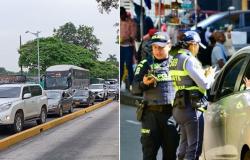In recent days, during a commercial flight between Bogotá and San Andrés, the video recorded by an Avianca user went viral, inside the passenger cabin of a plane with capacity for 180 people, which showed almost all users without users. of the chairs. The images of a literally unoccupied aircraft, operating that long journey to one of our most emblematic tourist destinations, continue to be disconcerting and devastating. However, they portray the worrying situation that the archipelago is experiencing, derived from the crisis its tourism industry is going through, the strategic axis of its economy and, in short, the only source of income for a high percentage of the population.
The island department of San Andrés, a territory anchored between the warm waters of the Caribbean Sea, has its economy closely tied to tourism, responsible for ninety percent of official income. Hence, its enormous sensitivity to the vicissitudes that the sector endures, such as the one it is facing in recent times, in which there has been a drastic reduction in visitors. We are orphaned by tourists, some leaders admit, recognizing the difficult moment that the Raizal population is going through, given its impact, not only on the hotel, hospitality and tourism businesses, but on the entire commercial and service network. The transversal impact suffered by the economy has repercussions on the entire value chain.
The tourism downturn has been occurring as a result of structural and cyclical factors, fueled by the not-too-distant ravages of the pandemic and the onslaught of Hurricane Iota. The apathy and corruption of the local political class leads to structural causes, reflected in the gradual deterioration of the urban and tourist infrastructure of San Andrés, including the limited Gustavo Rojas Pinilla airport, which receives more criticism than airplanes. Today the island, oriented towards sun and beach tourism, retains its charm, but seems to be fading away.
The current factors relating to the sector come from a chain of onerous taxes that have made travel and air activity more expensive. The increase in VAT on tickets and accommodation, the high cost of the entry card and the tax burden on aviation gasoline, which does nothing to stimulate the commercial interest of airlines, are triggers for the current explosive situation, which are added to the prices, often prohibitive, in the services of hotels, restaurants and a wide variety of businesses. The cost of accommodation and transportation is usually disproportionate when compared to other national and international destinations, to which tourists prefer to emigrate.
At the end of 2023, hotel occupancy in San Andrés and Providencia was 55.1%, marking a drop of 16.7% compared to 2022, a trend that worsened its decline during the last Easter holiday season, when it barely reached 40%. This discouraging panorama has been taking shape since 2021, with a staggered spread of visitors, who prefer to direct their travel interest towards national destinations with more varied, economical and land-connected tourism proposals, such as Cartagena, Santa Marta and the Coffee Axis.
Low connectivity has contributed to discouraging tourism. A year ago, San Andrés had 42 daily flights, a figure today reduced to less than half. Avianca recently reduced eight frequencies due to low profitability, further outlining the crisis generated by the cessation of operations of Viva and Ultra Air, in the first quarter of 2023, a critical situation for the islands, as the air supply was compressed and expanded excessively. the value of the tickets. The consequent stampede of visitors contracted the departmental GDP by -2.2%, the worst variation rate in the country, with the current consequences on local consumption, employment and investment.
Although this month the entry of travelers shows an upward trend, thanks to offers on tourist packages, and starting tomorrow the Chilean low-cost operator, JetSmart, will offer disruptive rates, below $200 thousand, fueling hopes of reactivation, the diagnosed problems of the archipelago demand immediate attention, through specific actions to attack the underlying causes that have turned upside down the present of this activity, the basis of Raizal survival.
The archipelago requires special treatment from the National Government, given its island status, with complexities that do not exist for the rest of our regions. Reconsidering VAT rates on tickets and hotels, providing tax relief, granting connectivity subsidies to air operators and promoting tourism promotion campaigns will contribute to reincorporating San Andrés into the national and international tourism portfolios. For its part, the departmental government is obliged to change the face of the islands and guarantee the provision of quality tourist services, with reasonable prices and zero tolerance for abusive behavior against tourists.
Launching the lifeboat to the archipelago of San Andrés and Providencia to pave the way towards sustainable blue tourism, generating renewable energy, is the most in line with what the President of the Republic proclaims. For now, we hope that the current holiday season will stimulate the massive presence of travelers – up to the maximum carrying capacity -, willing to support the economy of these paradisiacal Caribbean islands, surrounded by a beautiful sea of seven colors, but, also, as it seems to be today, by a dark sea of problems.
In the sector: The Brazilian airline GOL announced that as of October 27 it will begin operating a route between Brasilia, the capital of the country of samba, and Bogotá, a city with a strategic position as an international hub to connect South and North America. This increase in regional connectivity will benefit tourism and boost trade. From Brasilia, GOL operates daily flights to destinations such as Miami and Orlando, and its intention is to consolidate presence and leadership in South America.
In sector 2: The Colombian regional company Clic Air, one of the best performers in operating income last year, signed a strategic alliance with Codensa, to make it easier for the financial entity’s clients to purchase air tickets, through its easy credit system. The agreement includes promotion of special offers and contributes to democratizing air services in the country. Clic Air is the new face of EasyFly, a company led by Alfonso Ávila, a pioneer in the sector and one of the founders of AeroRepública.





